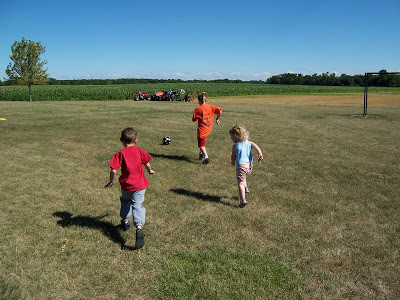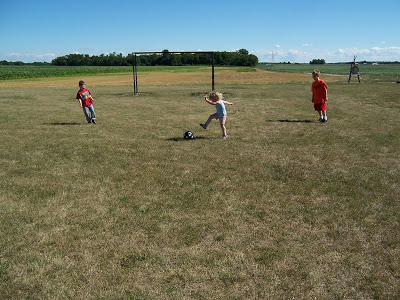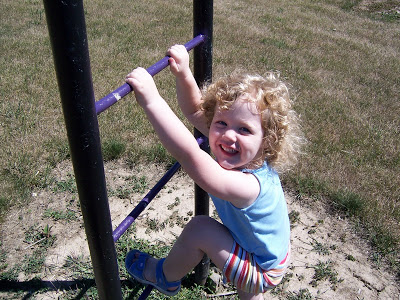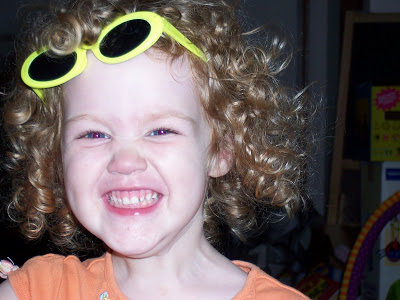So after the stress of last week, we had a full weekend outdoors where I tried hard to forget about anything involving the word “evaluation”. But it kept coming back at me.
Saturday we spent the day at a picnic with several good friends, many of whom we haven’t seen in months. One couple has a son who had many of the same issues that Cordy does now (he’s two years older), and it was nice to sit and discuss solutions they have come across to help him. At one point my friend remarked that it was like we had twins born two years apart. But her son has made incredible progress in the past two years, giving me a lot of hope that Cordy will, too.
Cordy had a wonderful time running in the large open backyard. She spent most of the time on her own, but she did join the two (older) boys in a quick ball game. Actually, she chased them, shouting “Ball! Cordy kick the ball!” and occasionally they’d stop and let her kick the ball.
She did have several meltdowns during the day, and she refused to eat much of the food. I think she did have fun, though. We just had to keep her away from the road and from the guys throwing knives in the backyard. By the time we left, she was completely coated in a fine layer of dirt. (She doesn’t mind the feel of dirt. Touching grass will set her off, but not dirt.)
Today, we joined Aaron’s parents to go to Inniswood Gardens to see the Big Bugs exhibit. The park was packed full of families with kids. Cordy did pretty well at first – when we came to the first bug sculpture, we let her out of the stroller to get closer. All was fine until she tripped and fell into the grass. She had a minor tantrum over that, but recovered quickly. However, that was enough to make every stop in the park a struggle. If we stopped, she wanted to run. If we wanted to go, she wanted to stay in one place. Over and over again during our time there, she would throw herself to the ground and cry and scream.
But today I paid a lot more attention to everyone around me. And I noticed that none of the other kids acted like Cordy. No other parents were dealing with the tantrum when telling their child not to touch the sculpture. No one else had to peel their child off the pavement just because they said, “Stop! Don’t run too far ahead of us.”
I also noticed other people staring at Cordy at the park. It was clear some people thought we had no idea how to control our child. I could almost hear their thoughts – What’s wrong with that child? Those parents don’t know how to discipline that kid!
Cordy’s a giant, which makes it even worse. She looks like an older three year old or maybe a four year old (she’s now wearing 4T), so people expect her to behave like one.
All I wanted to see was one hissy fit from someone else’s child. One tantrum, one episode of breath-holding or foot stomping or screaming or hitting or collapsing on the ground. But there were none. Today must have been Perfect Child Day at Inniswood, and we clearly missed the memo and brought our hair-trigger meltdown child mistakenly. I was painfully aware of how different she is while mixing with the other families in the park.
Part of me feels sad for her, because I don’t like to see her unhappy so often. She is a happy child – she can just go from happy to inconsolable faster than a method actor on speed. And I don’t want people to think of her as this screaming monster, which I worry is the image strangers take away after being near her. She is so much more than her tantrums.
And part of me, I’m ashamed to say, feels resentful. Resentful that I have such a difficult child while everyone else got the easy ones. Resentful that we can’t go anywhere and really have a great day, because there will always be at least one major meltdown to cloud the day. There will always be one point when Aaron will turn to me and ask, “Why did we think coming out here was a good idea?”
But then I feel guilty: Cordy doesn’t try to be difficult on purpose. She’s just a little kid! You’re an awful mother to resent your toddler for something she can’t control! She probably wants to fit in with other kids, but can’t. Bitterness to guilt to pity, then back to bitterness – it’s an awful cycle of emotions I’m trapped in. I don’t want to be here anymore.
Last week was a step forward. I’m feeling more at peace with the evaluation process and I’m eagerly awaiting the next step so we can get to work on helping Cordy cope with her issues and get past the frustration. Because instead of a face streaked with tears and scowling, this is the face I want to see more of:





